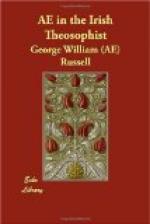There live of old in Eri a heroic race whom the bards sang as fearless. There was then no craven dread of the hereafter, for the land of the immortals glimmered about them in dream and vision, and already before the decaying of the form the spirit of the hero had crossed the threshold and clasped hands with the gods. No demon nature affrighted them: from them wielding the flaming sword of will the demons fled away as before Cuculain vanished in terror shadowy embattled hosts. What, I wonder, would these antique heroes say coming back to a land which preserves indeed their memory but emulates their spirit no more? We know what the bards thought when heroic Ireland became only a tradition; when to darkened eyes the elf-lights ceased to gleam, luring no more to the rich radiant world within, the Druidic mysteries, and the secret of the ages. In the bardic tales their comrade Ossian voices to Patrick their scorn of the new. Ah, from the light and joy of the faery region, from that great companionship with a race half divine, come back to find that but one divine man had walked the earth, and as for the rest it was at prayer and fasting they ought to be! And why? Because, as Patrick explained to Ossian, if they did not they would go to hell. And this is the very thing the Patricks ever since have been persuading the Irish people to believe, adding an alien grief unto their many sorrows, foisting upon them a vulgar interpretation of the noble idea of divine justice to cow them to submission with the threat of flame. Ossian, chafing and fuming under the priestly restriction, declared his preference for hell with the Finians to paradise with Patrick. His simple heroic mind found it impossible to believe that the pure, gentle but indomitable spirits of his comrades could be anywhere quenched or quelled, but they must at last arise exultant even from torment. When Ossian rejects the bribe of paradise to share the darker world and the fate of his companions, there spake the true spirit of man; spark of illimitable deity; shrouded in form, yet radiating ceaselessly heroic thoughts, aspirations, deathless love; not to be daunted, rising again and again from sorrow with indestructible hope; emerging ever from defeat, its glooms smitten through and through with the light of visions vast and splendid as the heavens. Old bard, old bard, from Tir-na-noge where thou, perchance wrapt by that beauty which called thee from earth, singest immortal songs, would that one lightning of they spirit could pierce the hearts now thronged with dread, might issue from lips which dare not speak.




